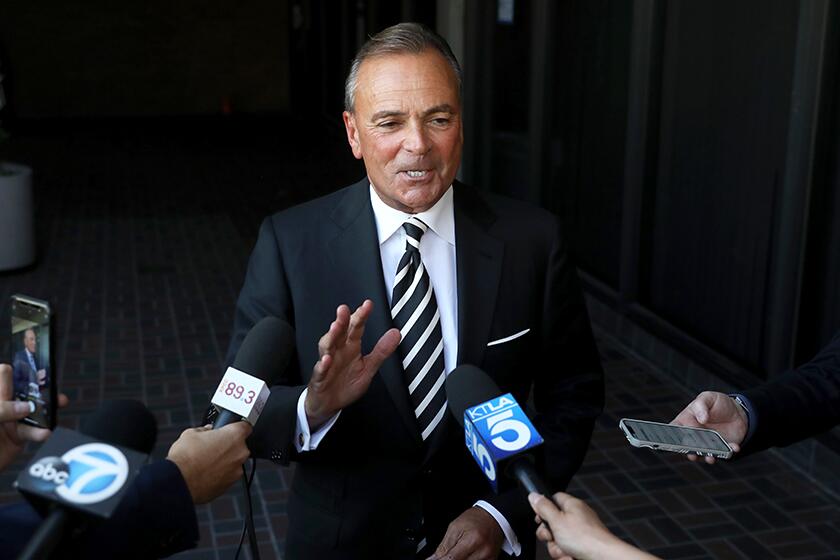Private Water Project Is All Wet
- Share via
California voters are about to witness another boondoggle that could end up costing $1 billion, contribute to rising water prices and damage the environment.
Under a controversial water storage project, Cadiz Inc. would receive $150 million in construction costs from Southern California consumers to build a 35-mile pipeline and store up to a million acre-feet of water in the Mojave Desert.
The project also would mine the local groundwater and sell it at a profit. This would be the first large-scale deal in California to permit private profit-taking for the sale of groundwater.
This is worrisome because in other states private control of water has resulted in skyrocketing prices, poor delivery and reduced water quality.
Keith Brackpool, chief executive of Cadiz, has contributed more than $250,000 to Gov. Gray Davis’ campaign and is a key advisor to him on water issues. Brackpool also has hired at least three former California legislators and, most recently, the former law firm of secretary of the Interior Gale Norton to lobby for preliminary approval on this proposal.
The Cadiz project was recently approved by the Department of the Interior. The next step is for the Metropolitan Water District of Southern California to enter into negotiations on a contract with Cadiz. Once that is done, the project would receive $75 million upfront for projected construction costs from the agency. Cadiz is supposed to be responsible for the remaining $75 million in construction costs.
However, Cadiz’s current loans from ING Bank in the Netherlands stipulate that all funds coming into the company must go to repay Cadiz’s line of credit. The question is, then, where will Cadiz get the money for the start-up phase? So far, no one has answered this.
The Cadiz proposal may cost the Metropolitan Water District as much as $1 billion over the 50-year life of the project, while the amount of groundwater it can deliver remains uncertain, according to initial estimates of the U.S. Geological Survey.
A coalition of public interest groups and Sen. Dianne Feinstein (D-Calif.) are demanding to know why this project has been fast-tracked while others--such as the Hayfield Valley Project--that keep water rights within the control of public utilities and use existing sites basically have been ignored.
The groups, which include Public Citizen, the National Parks Conservation Assn., the Sierra Club, the Western Environmental Law Center, Desert Survivors and Taxpayers for Common Sense, have studied the Cadiz plan and concluded that it is economically unworkable and would be a disaster for the environment.
Among the major concerns are that Cadiz grossly overestimates the amount of groundwater that it can legally extract from the Mojave aquifer and that it would harm the water table in distant areas, turn the surrounding area into a dust bowl, contribute to air pollution and drive out wildlife.
Cadiz has promised the Department of the Interior that it will set up a monitoring system to spot such problems. However, Feinstein and environmental experts say it is impossible to create one that would rectify the damage in time.
Should more water storage be required to reduce California’s dependence on a fresh flow each year from the Colorado River, five other water storage plans have been presented to the MWD. All would keep control of water in the hands of public utilities.
We need only to look at the problems in Atlanta to see what awaits us if the Cadiz project is approved. In Atlanta, the water is so brown that local families don’t want to drink it or bathe their children in it.
We can’t let that happen here.
Let the buyer beware: Private control of water can be disastrous for the consumer.
*
Jane Kelly is the director of Public Citizen, a consumer rights group based in Oakland, Calif. Web site: www.citizen.org.
More to Read
Sign up for Essential California
The most important California stories and recommendations in your inbox every morning.
You may occasionally receive promotional content from the Los Angeles Times.










